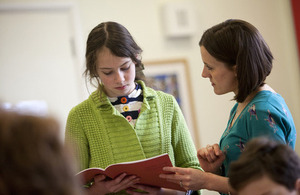More top graduates training to be teachers than ever before
The initial teacher training (ITT) census has been published today, showing that more top graduates are getting into teacher training.

Almost three-quarters of graduates starting teacher training this academic year have a first-class or 2:1 degree (74%), new figures published today show. This is the highest quality of graduates starting teacher training since records began.
The proportion of teacher trainees with first-class or 2:1 degrees has risen 3 percentage points compared to last year (71%), and 13 percentage points compared to 2009 to 2010 (61%), when records began.
One in 6 teacher trainees has a first-class degree (16%) – up from 14% last year and 10% in 2009 to 2010.
The School Direct training programme has the highest proportion of new trainees with a first-class or 2:1 degree. There has been a huge amount of interest in School Direct, both from schools and from candidates. School Direct has attracted more applicants per place than any other training route (3 applicants for every place compared with 1.8 for provider led provision).
Charlie Taylor, chief executive of the National College for Teaching and Leadership, said:
I am delighted that more top graduates are going into teaching. Teaching is a rewarding and fulfilling career - and our best graduates can make a real difference in the classroom. This will raise standards in schools and help every child achieve their full potential.
The initial teacher training census data for 2013 to 2014 published today shows the increase in the quality of graduates training to be teachers over a 5-year period.
Percentage of graduates starting teacher training with a first-class or 2:1 degree
| Year | Percentage of new entrants with 2:1 and above | Percentage of new entrants with a first-class honours degree | Percentage of new entrants with a 2:1 degree |
| 2009 to 2010 | 61% | 10% | 51% |
| 2010 to 2011 | 62% | 10% | 52% |
| 2011 to 2012 | 66% | 12% | 54% |
| 2012 to 2013 | 71% | 14% | 57% |
| 2013 to 2014 | 74% | 16% | 58% |
The quality of graduates starting teacher training has improved in all the English Baccalaureate subjects - including maths, physics, chemistry and languages, which have traditionally been hard to recruit to.
Percentage of graduates starting teacher training with a first-class or 2:1 degree by subject
| Subject | Recruitment year 2009 to 2010 | Recruitment year 2013 to 2014 | Increase (percentage points) |
| English | 75% | 84% | 9pp |
| Maths | 50% | 67% | 17pp |
| Biology | 60% | 74% | 14pp |
| Chemistry | 55% | 65% | 10pp |
| Physics | 50% | 65% | 15pp |
| Modern and ancient languages | 63% | 80% | 17pp |
| Geography | 66% | 76% | 10pp |
| History | 81% | 88% | 7pp |
In the 2014 to 2015 academic year, top graduates - those with a first-class or 2:1 degree - are eligible to apply for scholarships worth up to £25,000 (up from £20,000 this year) and higher bursaries, worth up to £20,000 in maths, physics, chemistry and computing. Scholarships are awarded by highly-regarded bodies such as the Institute of Physics, the Royal Society of Chemistry and the BCS, The Chartered Institute for IT.
The government introduced scholarships in 2011. Since then, 425 high-quality graduates in maths, physics, chemistry and computing have been attracted to teaching through the scheme. A further 680 teacher training scholarships will be available for trainees starting in the 2014 to 2015 academic year.
Percentage of graduates starting teacher training by route and degree classification
| Route | Percentage of trainees with a first-class or 2:1 degree | Percentage of trainees with a first-class degree |
| Provider-led | 74% | 16% |
| School Direct training programme | 76% | 18% |
| School Direct training programme (salaried) - for career changers who bring additional skills to the classroom. | 68% | 13% |
| All | 74% | 16% |
Notes to editors
- The ITT census is collected each year and provides information on: * the total number of new entrants to ITT recruited * the class of degree they have * other indicators such as gender, ethnicity and age
- View the census.
DfE media enquiries
Central newsdesk - for journalists 020 7783 8300